I'm very late posting these. The concert at Aqua Resort was delightful.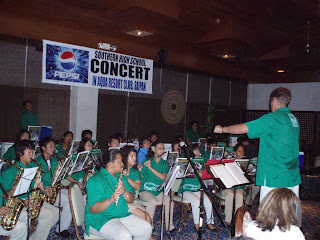
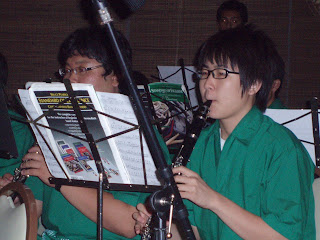
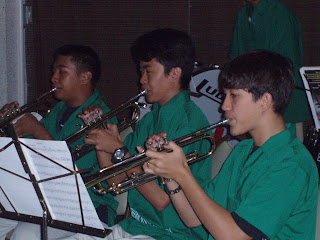
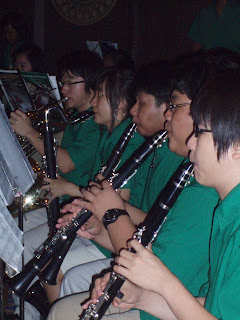
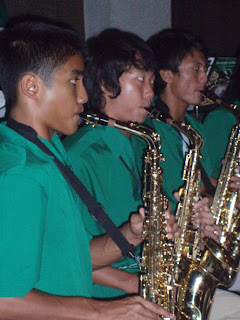
There was a lot of variety, from march to swing.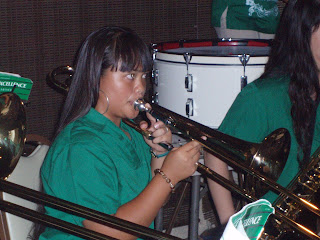
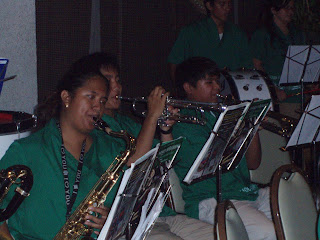
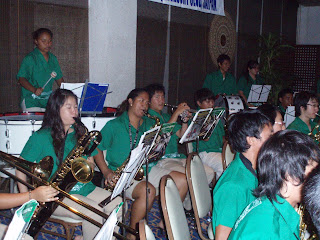
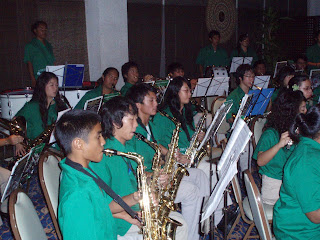
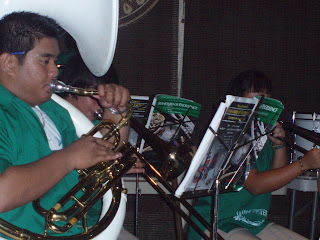
I'm sure the Manta Band members who are going to the Olympics in Beijing are very excited. Although the group traveling is small and select, every student in the Band is an asset to the group. If you get a chance to hear them play, I encourage you to take it!
Viewing: Blog Posts Tagged with: Saipan, Most Recent at Top [Help]
Results 26 - 50 of 85
Blog: Saipan Writer (Login to Add to MyJacketFlap)
JacketFlap tags: Saipan, Olympics, Beijing-bound, SSHS Manta Band, Add a tag
Blog: Saipan Writer (Login to Add to MyJacketFlap)
JacketFlap tags: Saipan, FOA, National Marine Monument, Taste of the Marianas, Karidat, Add a tag
There is simply TOO MUCH happening on Saipan these days. I want to go back to those kick-back evenings watching sunsets and drinking vodka tonics or mango margaritas or red red wine.


Tuesday evening, Friends of the Arts is having its annual meeting at the Marianas restaurant on Navy Hill. They usually have some students perform, the price of food is discounted, and there are a whole lot of people who enjoy drama.
Wednesday evening, watch the John Gonzales show. Hawaii guests will share their experience with the national marine monument that was designated in their northern islands.
Thursday morning 7 AM, if you're a morning bird and want to hear more, or missed the Gonzales show, hear from the same Hawaii guests on the Harry Blalock radio talk show.
Thursday evening, still have questions? Listen to a live presentation (and ask questions?) at the AMP.
Details of all the national marine monument discussion are, of course, on Angelo's blog.
Friday evening, don't miss the Karidat fundraiser. $50 gets you into the Aqua Resort Club dinner, and gives you a raffle ticket for some fun prizes.
Saturday evening, it's still Taste of the Marianas time at the AMP field.
I know there's more, but I'm having scheduling meltdown!
Blog: Saipan Writer (Login to Add to MyJacketFlap)
JacketFlap tags: Saipan, CNMI, Marianas March Against Cancer 2008, Add a tag
The Marianas March Against Cancer raised more than $70,000 this year! That's an amazing feat given that the economy here has gone from stagnant to inert.
As usual, the March was held at the athletic field at Hopwood Junior High school. All of the teams had booths ranged around the track. In true island style, I showed up about 9 PM for an event that "started" at 6 PM, and found out that they hadn't even finished introducing the teams, the over-night relay race of runners, joggers, and walkers around the track had not yet started, and I hadn't missed anything of note.
The atmosphere was great. There were a ton of people (I had to park in San Antonio!), the air was fresh and cool, and the familiar voice of Celia Mercado echoed from the speakers as she wrapped up the introductions, urged the teams to parade around the track, and then finally opened the track to the relay race.
The race was the usual mash of children and teens with excess energy dashing around the track at top speed, with a handful of slower, but not less dedicated, team members jogging and walking on the outer lanes of the track.
I wanted to add a photo here, but I didn't take any. Jack Hardy was busy photographing everything. But alas, I couldn't find any I could borrow. :-(
I don't know what team ran the most laps. I do know that TEAM BODIG did a great job in other categories. Team Bodig won the "spirit" award, which seems fitting because they had a great turnout of family, from the youngest to the oldest, and a whole lot of them were in MMAC tee shirts!
Team Bodig won the "best booth" award, too. They did an eclectic combination of broadway musical and Chamorro lisayu! Dorothy had escaped from Wizard of Oz and was serving hamburgers and hotdogs at the booth's food counter. You could take your food to an area of picnic tables, or detour down a yellow brick road that led through a rainbow arch, into a "room" with silk & paper flower streamers hanging from the tent ceiling, white pillars holding lit candle-glasses, and a multi-tiered altar covered with satin holding framed photos of the family members who had died from cancer. Only in Saipan.
Team Bodig also won the "most luminaries sold." They added more than 1,000 luminaries to the inside rim of the track, helping to light the route all night long.
And last and certainly not least, Team Bodig raised the most money of the teams in the family category (and I think overall, beating out corporate winner PIC by about $6,000).
Special kudos to TEAM BODIG! And kudos to all teams and their members, to all people in the community, who supported the MMAC, and to the sponsors and organizers. No one group could do this alone--this was truly a community effort.
Blog: Saipan Writer (Login to Add to MyJacketFlap)
JacketFlap tags: Shin Kimura, Saipan, ukulele, Jake Shimabukuro, Add a tag
While we're all fretting about the proposal for a national marine monument, federalization issues, economic issues and more, at least somebody in Saipan is practicing music! Wow!
Blog: Saipan Writer (Login to Add to MyJacketFlap)
JacketFlap tags: Manta Band, Taste of the Marianas, Saipan, Add a tag
I love this time of year.
Blog: Saipan Writer (Login to Add to MyJacketFlap)
JacketFlap tags: Saipan, Jake Shimabukuro, Photos, Add a tag
Love the Pew Charitable Trust banner!
Blog: Saipan Writer (Login to Add to MyJacketFlap)
JacketFlap tags: Saipan, Minimum wage, Minimum wage, Add a tag
I'd like to see a public hearing in the CNMI on whether to continue the minimum wage hike this May 2008.
American Samoa is conducting such hearings. See this Radio New Zealand item. And while we have some similarities to American Samoa (past reliance on an industry that is pulling out; and workers imported from elsewhere), our situation is not exactly the same. We are closer to Guam and Asia, perhaps with a bigger base for our second (now first) industry--tourism.
Of course, our Senate has already gone on record as opposing the wage hike and calling for a suspension of the small 50cent increase scheduled. Kudos to Senator Maria Pangelinan for being the lone voice of compassion and reason.
I think we need another minimum wage hike. With our current minimum at just $3.55 / hour, no one has a real incentive to go out and work.
I also wonder about the classified ads in the newspaper for jobs these days. Look at today's ads in the Tribune, for example. You'll see "1 carpenter...salary:$3.05/hour" and yardworker--$3.05 / hour; and commercial cleaner--$3.05/hour; and diesel mechanic--$3.05/hour; and janitor-$3.05/hour; and beautician-$3.05/hour; and cook--$3.05-3.25/hour--all from Philipppine goods Const. Inc. You'll also see auto mechanic-$3.05-$3.55/hour-A.C.C.S. Corporation dba Cartown.
How are these businesses offering these jobs at lower than our current minimum wage? We need the U.S. Department of Labor to come in and stop this, because obviously our own local labor department isn't. (And will probably certify these companies' employment of contract workers based on these advertisements.)
I'm also disgusted to see the usual array of skilled workers, all at minimum wage--graphic artist, mason, electrician, accountant. These are not typically minimum wage jobs in America. Just check on line any state and look at the classifieds in a local newspaper. I chose Ohio (since I grew up there eons ago). Graphic artist--like a page designer--listed as "entry level" pay, but with paid vacation, health benefits and a 401k plan! Construction workers--like maintenance worker doing carpentry, painting, etc.--$14/hour, plus paid vacation, medical benefits and a 401k plan. "Accountant"--translate this to a simple payroll clerk--$15.00 / hour.
Obviously there's a strong economic pull for our island workers to move to the states. We can't compete by offering equal pay as our mainland counterparts, but we certainly can raise our minimum wage, which in turn might help push up other wages on top of those. And thus we get closer to a decent, living wage.
With family and our beautiful environment, this could be enough to keep our local talent pool here, and lessen our reliance on foreign workers, make us more independent, and strengthen our economy from within.
Do we want this? Or do we want the same few businesses raking in profits for themselves by using cheap foreign labor, relying on people who are denied basic civil rights and a share in the economic pie? Do we want a community that values its local citizens as workers and pays them accordingly, or do we want to push our blue-collar working citizens out the door to Guam and the mainland U.S.?
Well, I know what I want. Thoughts, any one else?
Blog: Saipan Writer (Login to Add to MyJacketFlap)
JacketFlap tags: The Fantasticks, Friends of the Arts, FOA, The Fantasticks, FOA, Saipan, Friends of the Arts, Add a tag
The Friends of the Arts put on a great production of THE FANTASTICKS. Rom-com with music. Who doesn't love that? (Some of my photos from Sunday's production. And as always, the photos do poor service to the quality of the play.)
Blog: Saipan Writer (Login to Add to MyJacketFlap)
JacketFlap tags: Politics, Saipan, CNMI, Labor, Minimum wage, Minimum wage, Labor, CNMI, Add a tag
The CNMI got a 50cent raise in minimum wage (to $3.55) last July 2007, and is set to have another 50cent raise (to $4.05) this May 26, 2008.
It comes as no surprise that our illustrious governor is trying to put the kibosh on this next incremental raise, and all future scheduled raises (50cents each year through 2015, until we reach $7.25, which will be the minimum wage in the U.S. set for year 2009). He lobbied heavily against the first increase, and effectively insisted on having the minimum wage law include requirements for a study by the Department of Labor on the effect of the raises.
And he is not alone--the representative to the U.S. Congress from American Samoa has introduced a bill to stop the incremental minimum wage increases, which also apply to them.
The U.S. Department of Labor has now issued its report, and the Variety and Tribune have each reported the governor or his spokespeople saying how this report completely vindicates their argument that raising minimum wage in the CNMI is harmful to our economy.
Thanks to Ken Phillips at SOSaipan for a link to the actual report, which I've linked to, also, here.
Ken's comments are also helpful in orienting a reader to the report's "findings."
CNMI Governor Fitial is using the age-old practice of "spin" to argue that the DOL's latest report supports suspension of the minimum wage hike. See, e.g. this Variety news story or this Tribune story.
The spin includes distortions of what the report actually says, what people in the CNMI think about raising minimum wage, and characterization of the report as reaching a conclusion against implementation of the next minimum wage increase.
1. According to the Tribune article, "Increasing the CNMI wage to $7.25 an hour, the report said, is comparable to raising the U.S. minimum wage to $16.50 an hour." NOT TRUE.
First of all, the report actually says "The scheduled increase in the minimum wage to $7.25 (by 2015) will likely affect at least 75 percent of wage and salary workers in the CNMI. By comparison, in order to directly affect 75 percent of U.S. hourly workers, the minimum wage would need to be raised to $16.50, the 75th percentile mark for wage and salary workers who are paid hourly rates."
What this means is that the CNMI has a much larger segment of its working population suffering from the low minimum wage than the U.S. does. In the U.S., minimum wage is truly a "floor" and many workers obviously earn more than the minimum, which is why it would take such a much larger increase to effect 75% of them. This is not an argument AGAINST raising minimum wage here, but only highlights the urgency and desperation of why we need these incremental raises.
Second of all, the report is comparing apples and oranges--or really today and many years hence. The CNMI is not facing a raise to $7.25 this year. We are facing a raise to $4.05 this May. NOTHING in the report tells us what that is comparable to in the U.S.
2. The governor reports a "broad concensus" against raising the minimum wage to the next level here. Jeff Flores has already spoken out here that he disagrees, and doesn't believe people here are uniformly against raising minimum wage.
It's time to show that the Governor is misstating the facts about what the people in the CNMI want. Every worker here who earns minimum wage of $3.55 who is in favor of raising their minimum wage to $4.05 should contact Mr. George Miller or any of the representatives on the House Committee on Education and Labor. Any other person, whether you earn minimum wage or not, who feels it's important to raise the CNMI minimum wage to $4.05 this May, can also express their views to the committee members. You can see the full committee roster here. Or you can just write or call: Democratic Staff, 2181 Rayburn House Office Building, Washington, DC 20515, (202-225-3725).
3. The DOL report includes statements about the past that are informative, but nothing it says about the present effect of the minimum wage here or the likely effect another raise may have is at all reliable. The report itself denies reliability.
It notes that there are many adverse economic factors. In discussing the garment industry, the report says that lack of data make it impossible to distinguish among the various adverse factors as to which are having the greatest impact. (page 31)
Although the report paints a bleak picture and talks about how difficult having a raise in minimum wage is when times are tough, it also suggests that the tourism industry may rebound. If it had applied its own logic to this statement, this might suggest room for absorbing the impact of the minimum wage hike.
But most telling is this: "The CNMI does not yet have in place macroeconomic data collection and accounting-systems technology capable of generating information on total output and its components on a monthly or quarterly basis. As a result, there is not a way to provide objective measures of productive capacity, capacity utilization, employment, wages or unemployment rates...In the absence of complete and accurate macroeconomic data, there is no objective method to guage the level of aggregate economic activity, the level of employment it supports, or other important measures such as total personal income, consumption, savings and other metrics that explain the well-being of the population and the average citizen...The lack of such data are especially a barrier to assessing the current and future impact of the recent and scheduled increases in the minimum wage."
In other words--they're just guessing, and can't say anything objective.
The Governor's spin is nothing but more twist against what is fair and just--a living wage for workers.
Blog: Saipan Writer (Login to Add to MyJacketFlap)
JacketFlap tags: Weather, Saipan, federalization, CNMI, traffic, CNMI, traffic, Add a tag
The traffic lights were out in places on the drive to school & work this morning. It was busy. People were not stopping or taking turns. No police were directing traffic at the intersections. It was not the way to start the day.
It seems we will continue to face this problem, as CUC continues to have power problems. I wish the Legislature would address the traffic light issue with a simple law, and the police would enforce it. If a traffic light is out or malfunctioning, it should become and be treated as a stop sign. This slows traffic down--true. But then everyone knowns what to do, and everyone gets a chance to get through intersections, even if they're--heaven forbid--turning left.
Don Farrel's letter in the Variety today-here--is really good. The Governor, Howard Willens, Cinta Kaipat, and possibly Deanne Siemer all seem to be trying very hard to spread misinformation and fear as the means to combat the federalization effort. I know that there are important issues that the US Congress must tackle, but the CNMI needs their attention and an end to the current mess. We are stuck in this quaqmire, the worst of which may be listening to the distortions being thrown about by our current administration. Could we just get on with federalization now, please?
January in Saipan is my favorite month--weather-wise. The moon at night is huge, with a deep field of stars playing back-up. Days are sunny, warm, with a cool breeze coming in. Green and lush, tangerines and star fruit still plentiful. It's a tough life in the tropics, but someone's got to live it. :-)
Blog: Saipan Writer (Login to Add to MyJacketFlap)
JacketFlap tags: Saipan, Chalan Memoria, Chalan Memoria, Add a tag
At Boni's request (that tag thing), I'm taking a trip down Chalan Memorias. I arrived in Saipan on December 1, 1984, heading into my "new" job as Directing Attorney of the Marianas Office of MLSC. I stayed a week in the Hafa Adai Hotel, courtesy of MLSC, attended my first MLSC staff conference (which was then an annual event), and gradually overcame culture shock to put down roots here.
Some of the things I remember:
1. The first breath of hot, humid air. It had already snowed in Cleveland, Ohio, where I'd been living. The inside airplane temperature had been chilly. When I walked outside of the airplane and got my first breath of tropical air, I felt as if I were being suffocated. I was greeted by an entire office of people, awaiting me with a beautiful mwar mwar and lei. And the woman I would be replacing said, on the way to the hotel, something about how I'd chosen the "best" time of year to arrive in Saipan, when it was "cool" and "pleasant." I thought I wouldn't last.
2. Local directions, island time. I have a ton of these stories, but they all include going to the large breadfruit tree, or mango tree, or coconut tree, and turning there-can't miss it! And never being late. The first one occurred my first week here, when I had a u-drive, and two Chuukese women (one a secretary in the Chuuk office, and one her cousin) in the car, heading to Tank Beach for an MLSC barbecue. All we knew was to turn off some road on the back road--we went down the road to Old Man by the Sea, and later down the road to Santa Lourdes, and finally down the road to Kagman. We saw a whole family at a house on the road, and smoke rising, and yes-they knew our assistant director Eugenia Cepeda (it was her house!), and pointed the way-couldn't miss it. A half hour or more later we finally arrived, at least 4 hours after the time "scheduled" for the barbecue. There were only a handful of people there before us, and more arriving regularly. Our timing was great! The food would be there soon. Have a beer. (BTW, I love island time--I need to be told to arrive hours early so I can get there when I really should be there!)
3. fanihi--I eventually moved into a house at Eugenia's. Because I lived in Kagman in the 1980's, everyone thought I lived "far" away. The road down to Kagman then was just a coral lane that washed out in heavy rains and became deeply rutted. But I loved it back there, where Eugenia's family gathered for family parties--it seemed every day, but probably was just 2 or 3 times a week! At one of these, Eugenia was very happy because they were having fanihi soup, I really should try it, it's delicious, can't ever get that in the states, etc. Another MLSC attorney (Clara) and I considered, feeling game for a new, Chamorro dining experience. Eugenia described how fabulous this soup tasted and smelled, and eventually a big pot was brought to the picnic table. Clara and I wrinkled our noses. Eugenia was saying how it smelled like some animal in the states she remembered from her days in Louisianna, what was that animal, she forgot the name. Clara and I looked at each other and said "skunk?" and Eugenia said YES very excitedly. Fanihi soup was sounding bad. They took the lid off of the pot and there were these little creatures, their dead eyes staring up at us, looking for all the world like dead rats with wings, floating in murk. Ah--fanihi--fruitbat. (and learning the art of politely declining).
4. nightlife 1--The 80's had a whole host of nightlife offerings--not unlike those still operating. The 19th Hole, Angel's, the Southern Cross, the 4 Aces, the Palauan bars (Marianas Inn, I think, being the fave), and more. Some of these bars moved to new locations, and so we moved with them. My kumaire (well, she wasn't my kumaire then) would say, pick me up at 10, and Clara and I would arrive, to find that she hadn't even started to get ready, still needed to shower, etc. We'd get to the dance floor about midnight and stay to closing or beyond. I met Paz Younis on the dance floor of the club across from the Hyatt (and I'll be darned, I've forgotten what it was called then, or now.). Paz was a mother, teacher, respected citizen (and former nun), but on the dance floor, she was a maniac! I also learned quickly some very specific requirements--always ask "are you married?" answers like "I'm single for tonight" mean yes. answers like "no" mean go back to your office and ask your local staff what they know about this guy before agreeing to a date. (one time--yes, he's married and has 5 kids; half hour later, same co-worker--I should correct that answer-he may not be legally married, just living together, in case you're asking about legal status. No, you got it right the first time, thanks.--5 kids!)
5. nightlife 2--driving home from one of the bars about 3 in the morning with island friend in tow, heading down the back road toward Kagman road. STOP! STOP! There's a monster coconut crab crossing the road. (This before limits on taking/hunting, I think, but since I'd never seen one before, I'm not sure). Friend-Let's get it, got anything to catch it with? Me--a screwdriver? Friend--that works. Minutes later, coconut crab with pincer tightly clasped to screwdriver, is on floor in car. Later, it's in a pot of boiling water. Yum! After that, I noticed coconut crabs out at night, crossing the roads, a lot. Occasionally there would be a sickening crunch where I accidentally hit one. I never stopped to catch one again, though. The other creatures most frequently seen on the road at night were frogs. Saipan had TONS of frogs. And then, I stopped seeing the coconut crabs. And then frogs only rarely. sigh.
6. my first Xmas--1.--I hadn't moved to Kagman yet, but was house-sitting in Gualo Rai. The office had a party planned. Everybody cooks for the party. I was told to prepare taro and yams. (Um, I'm American, what are taro and yams?) Never one to shirk responsibility, I went to the farmer's market (I think it was across from the post office then) and bought those fingered-style yams and bulging taro roots (or do I have that backwards? still don't really know), and when I got back to the house, I tried to peel them. Slippery, slimy, hard--how many would I need? I'd been told how to prepare them by another American haole--what did she know? I boiled those things and couldn't tell if they were done. I'd never eaten them, were they supposed to taste like this? I finally put them all in a large tray, covered with foil, and then waited to be picked up. (This after the u-drive and before I had my own car. This, also before I knew that island time was a universal concept applicable pretty much everywhere but in court.) Waited, waited, waited. Hours went by. What had I done? I was on a tropical island for Christmas, having cooked taro and yams instead of cookies, and was stuck in a house without transportation, just me and those damn taro/yams. What kind of Christmas is this? I had just started to cry when Frank showed up. It was pretty hilarious. I've NEVER cooked taro or yams again (and don't plan to).
7. my first Xmas-2. More silly stuff for that first Xmas. The ex-pat community (because this was not the US yet) had a party. Bring a gift-less than $10, silly, kitsch, whatever. Every gift got numbered on the way in, everyone pulled a number from a bowl, gift handed over, but not opened, then swap meet, in numerical order, the last number being able to swap for anything preceding it. I gave a huge flag from Panama (don't remember where I got it), that was much loved by its recipient (forgot his name-he was Peace Corp), and received two champagne glasses with pale blue stems in the form of naked ladies (one still in my kitchen cabinet). Same ex-pat community had a hike--I was too new, but we hiked forever I think along telegraph ridge. It was hot and scratchy, but it wasn't snow or cold, so I liked it.
8. Typhoon Kim--12/4/1986. This is one month after the "end" of the TTPI (11/4/1986). I still lived in Kagman. I still had no phone or cable television. The road was still a coral dustbin. Another MLSC attorney who had been living in Chuuk and who was moving to Saipan had shipped his right-hand drive truck and all his belonging to Saipan. I had it sitting on my "carport", the bed of the truck and contents covered with a blue plastic tarp.
I hadn't a clue there was a typhoon coming. I didn't go to work because I didn't feel good (I think that might have been due to the drop in barometric pressure that brought the storm to us. or something.) I sat on my stoop and watched the sky go dark, noticed the birds stopped singing and everything went silent except for the wind in the trees. I watched the wind bend banana plants to the ground and whip coconut trees to a frenzy, with coconuts sailing through the air. (It was beautiful in Kagman where I lived.) The power went out. Eventually the rain came, and I shut all my louvred windows and closed the doors. The rain came through. I got out my towels and started tacking them up around the windows to try to keep the rain out. (I had no idea what a typhoon really meant, and learned the hard way to keep those towels dry, going to need dry towels later, let the rain in if need be, you can sweep it out afterwards...). Hours and hours of onslaught. A break. The sun came out. The storm had passed. Still standing.
A few hours later, night now, more rain, more wind, more typhoon. The typhoon had done a u-turn and come back to say hello. another six hours or so of rain, wind, the sound of roofing tins crackling in the air, along with trees. A friend banging on my door-his house completely flattened in the storm, can he and his roommate come in? Where's your car? Somewhere on the road down, abandoned-the Kagman road is partially gone, and a "river" forming alongside it's northern edge. By the next day, the storm was gone, the sun was blazing hot, and we had no power, no city water. We set up tin gutters send water in rain barrels, mopped out the house. I took hundreds of books from my Chuuk friend's truck and set them up in the sun to dry. The office was a mess, and we set up our legal library books in the sun there, too, to dry. I went to visit different staff. Frank's house (one of those Joeten houses in Fina Sisu) had flood water higher than the electrical outlets--time to move. A former co-worker (Randy, with his wife Nahid) had their beautiful glass wall facing Managaha completely blown out, expensive rugs drenched. We used their swimming pool as a community bath.
Did I mention I hadn't done laundry for a few weeks before the typhoon? So I had no clean clothes. I packed three suitcases of dirty laundry, hopped a plane to Guam, went to a laundromat from the airport, and returned with clean, dry laundry. Aah.
I was without power and water about 2 weeks. I remember Maria in the office was first to get power, but took a long time to get water. Maggie went six weeks without either. The island looked brown for months. And houses that no one knew existed were revealed on the hills and in the valleys everywhere.
9. Cablevision--remember when we had a weatherwoman?
10. Bar Association meetings--we used to meet and eat at Chamorro Village in San Vicente-road to LauLau Beach.
11. deaths and funerals--John Leonard C. Cepeda was shot and killed at the age of 16. He died on 3/9, I think the year was 1986, but I could be wrong about that. He was the son of Eugenia and Calistro (Kelly), my neighbors, landlords, and local family. I learned about the Chamorro custom of forgiveness--the boy who killed him (it was an accident, but not a nice one) and his parents came and begged forgiveness from the grief-stricken Cepedas. They accepted the sincere apologies and did not pursue any legal recourse.
I learned about Chamorro funerals-all 18 days (9 days public, 9 days for family). I opened my house (it was theirs, after all) to whatever relatives wanted to stay there, and ended up having hordes of teenagers camp in my living room. I listened to the rosary and other prayers, said at 8 AM, 12 noon, 8 PM and midnight for all of the first 8 days, with funeral on the 9th day, and then more daily rosaries (I think just at 8 PM ) for the second 9 days. I learned about "mesngon"--being stoic, and also about the Chamorro funeral wail on closing the coffin.
I've gone to many funerals since that one. The songs, especially at Carolinian funerals, connect directly to the soul. I love when the Bishop sings the "in paradisum---requiem." I usually stay through the tossing of flowers and dirt on the coffin in the grave.
And I've come to understand why the old ladies cry at funerals of people they hardly know, cry for distant relatives they may not have liked very much, cry at the least and the most important funerals. Now, each funeral connects to that spot of grief, and ritual, for every other death of someone I know, someone I cared about, and those I love.
When my father died in 1991, people in Saipan gave me money and helped me get on a plane and deal with the mechanics of living through the grief. For all the humor we can find in the island funeral (like Angelo's hilarious short film of ladies fanning the food to keep away flies), they are, imho, something blessed.
12. driving--I hated when they installed traffic lights. I liked the old days where people usually knew every car on the highway and who it belonged to. I still like the Rota wave.
13. Samoan housing--it still existed in Kagman and Garapan when I got here. I knew people who lived in those houses. I liked the style, the breeziness--but because of the architecture, you could hear anything being said in any part of the house, so better be careful!
14. Night fishing--I was one to stay on the beach and wait. When the fishermen came out of the water with their boxes filled, we knew to wait for the last man. He would be the one with the lobster! And then I would help clean fish (not my forte) to slap directly on hot coals or keep a stick (or tongs) on a still-moving lobster, also on the coals, to sear it for some of the best eating in the world.
15. The (other) Southern Cross--Mike DeSmith, I think, had a telescope-or was it the Kirby's? We stood on the cliffline in Koblerville and watched for the elusive moment when the Southern Cross came up across the horizon and was visible from Saipan. Aaah!
16. Banzai Cliff at night--before it was roped off with chains at night, you could drive right to the monument. I liked to go there to "cool off" and wonder at the most amazing night sky, accompanied by the rush and tumble of the ocean.
17. George Bush Sr.--when he was Veep, came to Saipan. Must have been before 1987--Clara and I stood on the highway leading from the airport, two lonely protestors, with signs. No one saw us (except someone later said it was improper to protest, not the "island way.")
18. Executive, Legislative, Judicial branches. The legislature was in the buildings on the beach (one, green--still standing) in Susupe. The Governor (Pete P) was in the southside of Civic Center, along with lieutenant governor (Pete A). The court-Superior then called Commonwealth Trial Court was in in the civic center buildings, north side--used by DPS and the passport office now. (Judge Hefner and Judge Soll on the bench.) Appeals went to Judge Laureta of the district court, in the Nauru Bldg. And there were still occasional hearings up on capital hill by the Trust Territory High court (Judge Munson, among others). MLSC Marianas Office was in the building where Marg's Kitchen is now (until 1986, weeks before Typhoon Kim, when we moved to an old building where the Guma Hustitia is now).
19. 360 degrees--only then it was the top of the Nauru Bldg, and I forget the name of the bar/restaurant. It was a favorite haunt for lawyers and other office workers, for happy hour. Alex Castro and Eddie Manibusan wrote out dirty Chamorro words on a paper napkin for me, as part of my local education. The Palauan waitress, who was known for being surly, turned into a complete sweetheart when my aged parents visited in 1987 for their 50th wedding anniversary. The drinks were great, the music greater.
20. local medicine, local practice--I went on a hike in Laulau, I forget the woman I was with (I want to say she was from a family in As Teo, but I'm not sure). I was tagging along as she collected medicine plants. I'd ask stupid questions like "what's that one for" and "how do you use it" and I kept getting answers like, for stomache ache, made like tea. Everything seemed to be the same. She couldn't just say, it's family lore and not information for sharing--too rude. I eventually learned small bits--the heartshaped leaves on the bushes along the walk by American Memorial-used for headache, just tucked into a bandana wrapped around the head; camias leaf, chewed and slapped on open cut (camias are those sour, green long fruits, also good for pickling); popcorn plant leaf--crushed and ground, used for dry skin; and of course the ubiquitous coconut oil-rubbed on achy tummy, dry skin, congested sinuses. When you're in the boonies and need to use the "facilities," say "Guelo yan guela" forgive me, I'm going to pee on your face. Always respect the ocean, and Don't shout at shoreline [is this only at sunset?] (raises the sea's anger?). Don't sweep the house at night (chases away friends, visitors). I know there's more and more and more.
But the lane is closing and it's time for lunch, I mean, work.
Blog: Saipan Writer (Login to Add to MyJacketFlap)
JacketFlap tags: art, Saipan, You Tube, CNMI, Not Gauguin, videos, You Tube, CNMI, Not Gauguin, Add a tag
Blog: Saipan Writer (Login to Add to MyJacketFlap)
JacketFlap tags: employment, Saipan, CNMI, Labor, human trafficking, P.L. 15-108, Add a tag
I'm still tracking through the new labor law, and I'm still on the purposes. (Part 1 is posted at Post # 160.) There are some good statements in the purposes with which I agree, and a few more subtle assumptions with which I disagree.
On the good side, these statements:
"...a minimum wage rate may not be sufficient to attract citizens and permanent
residents to take a job for which they are qualified."
And this:
"Wage rates will not rise so long as cheap foreign labor is available."
And this:
"The Commonwealth has the responsibility to provide fair employment conditions
for foreign nationals, to use their labor for the purposes of economic growth
and stability for which it was intended, and to regulate labor practices in
order to protect against potential abuses."
But then the law seems to eschew the most obvious means of addressing these issues: 1) a higher minimum wage; 2) a real and enforced moratorium / limit on the number of foreign workers in the CNMI; and 3) application and enforcement of all federal labor laws; promotion of unions; and, most importantly, treatment of all workers equally.
The purposes section promotes the idea that locals need to have less competition to get the jobs they "should" have, and those jobs should be the ones for which they are "educated"--the management and professional jobs.
Some of the problems in this part of the purposes section:
"The Commonwealth's goal is to establish a regulatory environment so that jobs
are available for its qualified high school, college, and graduate school
graduates."
The market place generally favors the more educated worker with higher wages, but the under-educated (those who have dropped out of school before getting a high school diploma) can contribute valuable skills and labor to a healthy economy. They should not be ignored. The policy of the government should not continue this prejudice against blue-collar work!
Another problematic statement of purpose:
"If the job is reserved for citizens and permanent residents, then the
competitive economy will cause the wage rate to rise to a level that citizens
and permanent residents find acceptable."
The CNMI Labor Department has failed to classify jobs for the past 25 years, and has allowed employers to hire foreign workers at minimum wage for jobs like accountant and engineer! We do not need to "reserve" jobs for the CNMI local residents to push up the wage. We do not need to perpetuate a two-tiered system of labor-with local workers in designated (high-paying) segments and foreign workers in the other (low-paying) jobs. This type of system invites abuse. The preference for U.S. and permanent resident workers is legitimate and needs to be enforced. But we need to enforce that preference in all job categories, and not create a two-tiered system of labor. We need our work force to work together, not separately.
There is another way of addressing the issue of artificially depressed wages in professional, management, and skilled jobs. Besides increasing the minimum wage-which encourages greater participation by everyone in the labor market, the CNMI Labor Department can set ranges/brackets of reasonable wages that must be offered for certain types of jobs if foreign workers will be used. This is less problematic on an equal protection basis than barring foreign workers outright from jobs. If our minimum wage is 50% of the U.S. minimum, then the range for an accountant's position could be 50% of what accountants earn in the U.S. When the job is advertised, resident workers can see the potential for greater earnings than minimum wage. This doesn't make us competitive or on par with the lure of the U.S., but is does provide for a balanced and consistent wage structure. And this benefits everyone. Many people who live here want to stay and willingly earn less than in the U.S. in exchange for the many beautiful and beneficial offerings the CNMI offers. The resident work force that is attracted to the higher paying jobs in the local economy can get these jobs if they want.
And yet another problem in the statement of purpose:
"The overall guiding policy with respect to foreign national workers is to
provide for a stable work force and protect due process rights without creating
entitlements."
It is that last bit--without creating entitlements--that I find troublesome. Our government has let in a huge number of alien workers over the past quarter century. They are not automatons, robots, who work and earn their pay and have no human life. They are people, with relationships, children, ties to our community. This bit of the purposes ignores the reality that has already occurred from the decisions of our leaders to allow this long-term alien population in the CNMI. Their children are U.S. citizens, born here. The children have entitlements that are shared by all U.S. citizens. These children, upon reaching 21, can petition their parents into the U.S. for green card (immediate relative) status. These children will vote in CNMI elections.
The fear that our local island population will be over-run by a "foreign" resident population is misdirected at the alien population. Our leaders have ensured this result by their decisions of the past, despite warnings, despite encouragements to have moratoriums on hiring foreign workers. It it too late to take back the CNMI from the natural consequences of the decisions CNMI Chamorro and Carolinian elected officials have made.
When I first arrived in the CNMI, we had a "permanent resident" law included in our CNMI code. It was repealed, on much the same thinking as now proposed in P.L. 15-108--the idea that the way to protect a cultural heritage is to deny others equal political status. This does not protect culture of any worthy kind. It only promotes evil.
One last bit before I close this long post:
"It is the intent of the Legislature that this Act shall not apply to persons
admitted to the Commonweatlh as tourists, or to persons employed illegally, i.e.
without the approval of the Department of Labor, or to those persons employing
others illegally in the Commonwealth unless specific provision has been made
herein."
The CNMI government is painfully aware that we have a human trafficking problem. Despite their repeated efforts to cover up current abuses and their insistence that the problem is a thing of the past, we keep seeing this. Especially in the sex industry--today's story is Club Jama. We've had the Red Heart Lounge, and the StarDust and Star Light nightclubs and others--all in the last two or three years.
When girls and women are trafficked into the CNMI they are almost always brought in as tourists, and then forced to dance naked or prostitute, kept locked in barracks or escorted everywhere they go.
Before P.L. 15-108, these girls and women could file labor complaints. And the Labor Department was fairly good at investigating. Now trafficking victims can't get this help. I think this is just another means the CNMI government is using to hide the reality of human trafficking in the CNMI. Workers, whether lawfully employed or tricked into unlawful employment, or foolish enough to agree to unlawful employment, are still laborers and deserve the protection of labor laws. It's not enough that the government may take up the case for the trafficking victims. They need easy access to a complaint mechanism that other workers have, too.
I'm not impressed by the purposes of P.L. 15-108. A law built on this foundation cannot be a good labor bill for the CNMI.
jmho.
Blog: Saipan Writer (Login to Add to MyJacketFlap)
JacketFlap tags: resolutions, Saipan, CNMI, legislators, Ron Hodges, free speech, Add a tag
Tuesday's newspapers reported on a proposed House Resolution, signed by Stanley Torres and 8 other members, to castigate Ron Hodges for opinions he expressed publicly.
It is the representatives who should be castigated and censured for their tactics of intimidation and repression.
As reported, the resolution gives a nod to the First Amendment. Obviously the representatives have heard of the right to free speech and freedom of the press. Equally obvious, they don't understand what these mean.
I don't know Mr. Ron Hodges personally. I've read his letters in the paper, like many other people have. His letters stand firmly for the protection of human rights, whether the humans are citizens or not. He finds fault with our government leaders and others in the community for failing to accord basic human dignity to their fellow workers who happen to be aliens. And he has expressed frustration at what he perceives as unfair treatment.
I often agree with his sentiments, if not with the details of his proposals. And his "spit in the soup, graffiti everywhere" tirade was one of those expressions of frustration that I disagreed with. As did others who wrote in response with reasoned and heartfelt opinions.
Mr. Hodges responded to their objections, also with reasoned and heartfelt considerations.
This is what the marketplace of ideas is all about.
TO OUR REPRESENTATIVES: We are smart enough to hear ideas and think about them intelligently. We don't need you to protect us from ideas that you find offensive.
I find the Representatives' statement that Mr. Hodges should "not avail himself of island living anymore"--i.e. go back where he came from-- far more offensive than anything he said, and a good example of racism and bigotry in office, trying to stamp on constitutional rights.
I hope the resolution is not passed. And I will never again vote for any of you who sign or vote in favor of these kinds of resolutions.
It's time you worked on the problems of the CNMI. And the solution is not to abuse your legislative privilege to chill the expression of free speech, to attempt with your "resolutions" to silence those of us who point out what we feel is wrong. The solution is to identify the problems and find ways, within the constitution, to address them.
Blog: Saipan Writer (Login to Add to MyJacketFlap)
JacketFlap tags: P.L. 15-108, employment, Saipan, Labor, Add a tag
P.L. 15-108 is 71 pages long. So I'm going to comment on bits and pieces of it, as I plow through it. These are my initial thoughts. I may revise them as I get to other sections of the law. I may re-think my positions and analysis as information or other comments come to light.
And because the bill is 71 pages long, I won't comment on everything. I haven't formed any strong feelings based on the coverage yet. I've been somewhat amused by all of the back-and-forth debate, wondering how much of it is just over-reaction and how much is warranted.
So here goes--my first foray into P.L. 15-108:
I got to the bottom of page 1 without screaming. Already I didn't like what I was reading. The law begins as most laws do with a statement of "findings" and "purposes." These are often instructive in how the language of the law should be interpreted, so I like to read these.
But this one starts with a purpose of achieving more employment for resident workers. That would be good. But I didn't like the "finding" written into the law that Chamorros and Carolinians should get even more preference than U.S. citizens and U.S. Permanent Residents for training and hiring. I think the notion that such preference is desireable goes against the fundamental freedoms of our U.S. and CNMI Constitutions that provide for equal protection.
And I didn't like the inference that locals should be groomed for management only jobs. I'm not fond of the prejudice against blue-collar work. It crops up again and again here. I don't think it makes economic sense. It runs directly counter to what economists (quoted in our local papers from sources like Wall Street Journal and other reputable business-oriented publications) are saying is the bedrock of an economy that can grow and thrive. And I find the prejudice against blue-collar work morally offensive.
So by the bottom of page 1, I'm not liking this bill much.
At page two, I found this:
The Covenant envisioned the employment of foreign nationals in the Commonwealth in order to create an economic base that would provide the citizens of the Commonwealth the economic opportunities and standard of living that their counterparts on the mainland are able to enjoy because of the vast area and large population from which communities on the mainland may draw employees.
What does this mean? It sounds to me like we get rich off the backs of cheap foreign labor. And we don't dirty our hands with the work ourselves. And that's our glorious vision for the CNMI.
And this purpose is "esteemed" because it's written into our Covenant. It's a bedrock principal!
I've read the Covenant. I've read the committee reports that constitute the legislative history of the Covenant. No where is there any such purpose stated.
The Covenant provided for local control over immigration in order to avoid problems with too many foreign nationals coming into a small community. The worry was not that we needed labor to sustain our industry; we could get that with U.S. controlled immigration. The worry was that the U.S. controlled immigration would not be responsive to our small, local issues and would allow foreign labor to overrun the island and change its character.
How do I know this? I wasn't here then, but as I've said, I read the reports. None of the reports--the House Committee Report (#94-364), the Senate Committee Reports (#94-433, 94-596), the Marianas Political Status Commission Memorandum, the Administration Memorandum, all assembed in a handy Section By Section Analysis prepared by Herman Marcuse of the Department of Justice--mention anything about providing cheap foreign labor so the locals could use them to raise their standard of living. The only comment about the reason for local control over immigration is this, from the Senate Committee Report, echoed in the Administration's Memorandum:
The Immigration and Naturalization Laws (subsection (a) [of Covenant sec. 503]. The reason this provision is included is to cope with the problems which unrestricted immigration may impose upon small island communities. Congress is aware of those problems. See, e.g., Alien Labor Program in Guam, Hearing before the Special Study Subcommittee of the Committee on the Judiciary, House of Representatives, 93d Cong., 1st Sess., pp. 19-25.
The vision of the CNMI's founding fathers was local control of immigration to limit the numbers of foreign workers. How badly did we screw up? Our government let in unlimited numbers of foreign workers, and we are overrun. And now our local population is a minority in its own place. That was exactly what the Covenant was supposed to protect against, but didnt work out.
So the "vision" now espoused in this latest law, because we can't admit that we made mistakes and didn't live up to the real vision, is one that our Legislators have concocted, not one that was built into our Covenant.
And it's an awful vision.
With this vision, I see the people of the CNMI standing on the back and necks of the poor foreign workers. While the people of the CNMI enjoy middle class life, the foreign labor eats the dust on the floor.
That's what these words say to me. That's what is hidden in the text of the purposes. That we must have a social stratification, where locals are the owners and managers and foreigners are the peons.
And it's wrapped up in red, white, and blue--saying that this is what they have in the U.S. and we want it too!
And that's another distortion. In the mainland U.S., all people can enjoy the benefits of the large populaton and industry that can be built with it, but all people are entitled to be treated equally, too. The workers in those factories are U.S. citizens who organize into unions and bargain for better wages and benefits. The owners can't deport them when they complain.
The stated purpose of P.L. 15-108 is designed to keep foreign workers in subjugation to us.
Is there some other reading of this purpose? Is it just a neutral saying that we need foreign workers because we don't have enough local labor force to maintain industries?
I don't think so, because then it would say that we are employing foreign workers to help us create an economic base, where all people in the CNMI could enjoy a better standard of living.
The specific design of this purpose puts the workers on the economic base side and the locals on the enjoying a better life. There's no shared work and no shared benefit. That's by design.
As a purpose for a law that governs how we live, we should be striving for a higher, more ethical way of life. This island if filled with "Christians." Christ argued for a living wage, not exaltation of locals over foreigners. Not special preferences at the expense of others. Christ was a blue collar worker--a carpenter.
We have a long way to go, and a lot of wrong thinking to overcome. Our legislators and Governor should hang their heads in shame for allowing this purpose to be included in P.L. 15-108.
As a small side note: I'm sure someone will say why didn't I address these comments when the bill was being considered. The simple answer is, I can't unless I receive a specific written invitation directed to me (and not the general public or general bar association, etc.). I work for an organization that has regulations prohibiting comment to influence legislation, unless specifically solicited. (And even when I receive a request, I'm sometimes too busy to put my professional time into it. This blog, I do on my own time.) Once a law is passed, it becomes fair game and I'm free to comment.
As another small note: It shouldn't take a comment from me for our Legislators to see how offensive these findings and purposes are. Or to read the Covenant and the historical documents and see what was really said, what the true purpose was.
Blog: Saipan Writer (Login to Add to MyJacketFlap)
JacketFlap tags: elections, Saipan, Saipan Casino Act, Add a tag
You can get the election results here. I'm just glad the Saipan Casino Act went down in flames.
Angelo has a discussion going on about the effect of blogs on the vote. I'm sure others are licking their wounds or celebrating in style.
As for me, I'm enjoying the relaxed post-election atmosphere. The tension from the uncertainty has drained away. Good or bad, whether you like the results or not, we now know what we'll be living with for the next few years.
I personally was surprised that so many incumbents won re-election. And I would like to hear what others think is the reason?
Do we not blame them for the present predicament? Are we still having candidates win based on family size? Are the incumbents who won somehow perceived as different than the others? What's up?
Blog: Saipan Writer (Login to Add to MyJacketFlap)
JacketFlap tags: Saipan, questions, Saipan Casino Act, NMD, Add a tag
I hope that the Saipan Casino Act will not get the 2/3rds majority of qualified voters' votes in the upcoming election.
But I have a question about the mechanics of the Act. Call it professional curiousity. I haven't been able to figure out what is supposed to happen in regards to the stock if the proposal becomes law. The proposed law, as written, seems confused and incomplete.
Article III, Section 2 says:
(a) The commission, upon this Act becoming law, shall issue the casino license only to the Northern Marianas Descent Investment Corporation (NMDIC). The license shall be perpertual.
(i) The NMDIC shall be a profit corporation established in accordance with the laws of the Commonwealth of the Northern Mariana Islands.
(ii) The incorporators, directors, officers and shareholders of the NMDIC shall be persons of NMD.
(iii) NMDIC shall issue shares of common stock duly subscribed in Five Hundred Dollar (US $500.00) par value per share and preferred stocks duly subscribed in one dollar ($1.00) par value per share to natural NMD persons only.
(iv) No natural person of NMD shall own more than one (1) share of common stocks and twenty-five thousand (25,000) of preferred shares.
(v) Any natural person of NMD, who is eighteen (18) years of age or older may subscribe to only one share of common stock and not more than twenty-five thousand (25,000) preferred shares of NMDIC, and pay for such share in an installment amount to be determined under a share subscription agreement with NMDIC. Each common stock shareholder shall be entitled to one vote during shareholders meeting or other events and business of NMDIC. However, for the purpose of computing, declaring and paying dividends per share to be paid, it shall be based only on fully subscribed and paid share.
(vi) Authorized Stocks. NMDIC shall authorize number of capital stocks to meet the current and growing NMD population in the Commonwealth pursuant to this Subsection.
So my first and basic question is what happens to a person's stock when he or she dies? Can it only be inherited by someone who is also NMD? What if all heirs already have their own one share? Or there is no NMD heir? Is it bought back and the money paid for it inherited? Does the share disappear?
The whole thing about the number of stocks also seems financially troublesome. Is there a fixed number of shares, open for purchase, or is it that all NMDs have a right to purchase one share of common stock?
It seems as if any and all NMDs have a right to buy into the NMDIC. It seems as if the number of shares will constantly fluctuate and increase with population. But if that's the case, then as NMDs reach age 18, they can automatically purchase a share of common stock, constantly diluting the shares of those who already have one.
Or will it be that as fewer and fewer people meet the 25% NMD blood requirement that there will be fewer and fewer who are eligible to own the stocks?
On a different note, and issue: the people who control the NMDIC can let friends and family have a share without paying, to give those friends and family a vote at (important) meetings. Do they have to let all NMDs have the same access to an unpaid share? Isn't it interesting that people can vote without paying for their share?
Anyone with ideas, feel free to clue me in.
Blog: Saipan Writer (Login to Add to MyJacketFlap)
JacketFlap tags: love, Saipan, puppies, Add a tag
Thanks to Betty Miller and Angie Wheat, who are sending around a list of descriptions about love, written by little kids (ages 4 to 8). This one comes from the list:
'Love is when your puppy licks your face even after you left him alone all day.' Mary Ann - age 4
If you need a little more love in your life, I can help. I have six adorable puppies up for adoption. They were born on October 1, 2007, are certified Saipan boonie dogs, and need good homes.
Contact me here (or use my e-mail in the profile). I'll try to post photos, just in case you need a little more convincing.
Blog: Saipan Writer (Login to Add to MyJacketFlap)
JacketFlap tags: Writing, JacketFlap, Saipan, NaNoWriMo, Add a tag
I received an e-mail today that my blog is now featured on JacketFlap. I signed up for that months ago when I was doing a lot more with the "writing" part of Saipan Writer and less with the Saipan part. With election season and interesting local issues in the forefront here, I've all but forgotten the writer part of my blog duties!
But I just finished reading a mid-grade novel, RICKSHAW GIRL by Mitali Perkins and will be reviewing it in my monthly book review column.
And NEXT MONTH is NANOWRIMO! That's national novel writing month--a crazy time when you crank out a 50,000+ word novel in just 30 days.
This will be my third year participating in NaNoWriMo. Joe Race is planning on joining again this year. We both finished last year, as others fell by the wayside, left eating our dust! If anyone else in Saipan is interested, let me know. Last year, we held weekly write-ins and it worked well.
Blog: Saipan Writer (Login to Add to MyJacketFlap)
JacketFlap tags: Economy, beautiful environment, Saipan Casino Act, Saipan, Add a tag
One last --easy-- post on the Saipan Casino Act initiative.
EDIT: I haven't found the Saipan Casino Initiative on-line and can't link to it. But if you want a copy, let me know. I'm willing to make a few copies and pass them along.
ON REGULATING CASINOS
At the debate, I complained that there was nothing in the bill that provided for INDEPENDENT regulators. Paduna said I was wrong (well, he SHOUTED that I was wrong, wrong, wrong). See if you can find any of these things:
1. a requirement that the commissioners NOT have any interest in the license-holder, casino operators or other gambling/casino interests.
2. a requirement that the commissioners NOT come directly from employment at the casinos.
3. a requirement that the commissioners NOT be able to go directly from their job as commissioners into the casino industry.
4. a requirement that the commissioners NOT have close family members with an interest in the license-holder, casino operators or other gambling/casino intersts.
5. a requirement that the commissioners NOT have close family members working in the
casino industry.
You won't. The SCA would invite the casino industry into Saipan WITHOUT INDEPENDENT REGULATION. And without independent regulation, the casino industry will be more likely to be corrupt, have illegal and unethical practices, and fail to pay over the benefits we're supposed to reap.
ON THE SCA'S MONOPOLY
At the debate, the pro side insisted the Saipan Casino Act does not create a monopoly. They did this in two ways--1) saying because all indigenous could buy a share in the license-holder, there was no monopoloy; and 2) saying the indigenous compnay was only a "regulatory" monopoly.
1. See if you can find anyplace in the the SCA that permits a second company of all indigenous people to hold a separate license and operate casinos in competition to the first license-holder's casinos.
2. See if you can find anyplace in the SCA that says the indigenous company that will hold the license will be for regulation only and not for profit.
The SCA will grant THE EXCLUSIVE, and perpetual, PRIVILEGE by law to one and only one investment company for the license to operate casinos in Saipan. The company will be a business operating FOR PROFIT. This is a monopoly.
Monopolies do not have the usual market forces to help keep them in line. So not only will there be no independent regulation of the casino industry in Saipan, there will not even be market forces operating to make sure the casinos stay above-board.
AN END TO THE POKER ARCADES
There seems to be a growing notion that the appearance of casinos in Saipan would end the proliferation and prominence of poker arcades in our community. I'm not really sure how this is supposed to happen. (It was repeated over and over that casinos would be well-lit and our local people wouldn't go in there. I'm not sure the reasoning behind that analysis, either, but it would be inconsistent with the idea that demand for the poker-machines would be diverted to the casinos.) The closure of poker arcades hasn't happened in Tinian.
1. Find someplace in the SCA that changes our poker-machine laws.
AND UNTOLD RICHES FOR ALL
One of the lures of the casino industry is the promise of wealth. But the casino industry does not create wealth--it doesn't take some natural resource and make it into a valuable product. It just packages gambling as fun and redistributes existing wealth. For the casino industry to "generate" income, people have to lose. The entire casino industry is premised on this simple fact. The machines and tables and games are all set up so that there are consistently more losers than winners.
One of the myths of the casino promise is that wealthy people play at the casinos and lose income they can afford to do without. This myth isn't entire false, which is why it is so attractive. There are wealthy people who play games at casinos and lose big money.
Will those wealthy people choose to gamble at casinos on Saipan or Tinian, rather than Macau or Singapore? I mean, really, if you were wealthy, where would you choose? I love Saipan and all of the CNMI, and I love it the way it is. I can't see casinos and neon-light as an improvement. And I can't see us ever getting to the point of being legitimately competitive with Macau and Singapore for those wealthy gamblers.
And then there are the others, not so wealthy gamblers, losing money at casinos that they can't afford. These might be tourists or residents. They might be our soldiers and sailors stationed on Guam. Casino income is a reverse or regressive tax--taking money from those most desperate to try their luck.
And while casino owners and operators usually make profits (with the notable exception of the Tinian Dynasty), people in the community don't necessarily see an improved lifestyle. This is reflected in the increase in bankruptcies in communities with casinos. This is reflected in the fact that Las Vegas has the highest rate of home mortgage foreclosures in the country right now, and a depressed housing market.
Just be sure you realize there's NO GUARANTEE in the Saipan Casino Act.
A BETTER WAY
Proponents of the SCA hype casinos as "the only alternative" that Saipan has to get out of the economic slump. This is a lie. Other communities in the past--going back for centuries--have had times where they faced economic hardship. They didn't have to turn to casinos to recover. We don't either.
And just because other communities have chosen to have casinos is no reason for us to do the same. We aren't lemmings. We have a unique culture and beauty that we can develop.
We should work on building the community, rather than just building the economy. The community encompasses economic aspects, but it looks at the larger picture and works from there. I agree with Tina Sablan that we need honest government and an investment in our people and culture as a basis for promoting our fledgling economy. We should stop looking for the one-trick pony to ride (like the garment industry, EDIT-a certain kind of tourist-EDIT, casinos) and start promoting initiatives by our resident population for small and medium-sized enterprises that will build a solid base for happy community life.
Blog: Saipan Writer (Login to Add to MyJacketFlap)
JacketFlap tags: math, Saipan, probability, casinos, Saipan Casino Act, Add a tag
I'm so glad to be finished with the official debate on the Saipan casino initiative. (And I dread seeing myself on local television!)
In a bit of follow-up research, I found this nifty site that offers a curriculum from Harvard Medical School for middle school kids on mathematics, probability and gaming--to help educate them about gambling and risk. FACING THE ODDS.
I like the bit about helping kids make the transition from "magical thinking" to "mathematical thinking." I'm not in middle-school, but it's been a long time since I took "probability and statistics" in college, so even I would like to be a student in this class!
(And now I hope to turn my blogging back to writing--and getting ready for NaNoWriMo!)
Blog: Saipan Writer (Login to Add to MyJacketFlap)
JacketFlap tags: chip stealing, Saipan, casinos, Add a tag
A letter in the newspaper today suggested that we educate ourselves about casinos. Good idea!
Good, clean fun? Better watch out.
Blog: Saipan Writer (Login to Add to MyJacketFlap)
JacketFlap tags: democracy, Saipan, federalization, CNMI, sovereignty, political union, Covenant, Add a tag
I rarely agree with Anthony Pellegrino. I've gotten to the point where I usually read the first paragraph of his columns or letters and move on. So I'm surprised to read his column today and find that I agree with all of it.
I was here before the Covenant became "fully" effective, when people in the CNMI were "interim U.S. citizens." The choice to become U.S. citizens and have a Commonwealth in political union with and "under the sovereignty of" the U.S. was still being embraced as a great deal, the right choice, a happy beginning to a new era.
As with all new ventures, when the honeymoon is over, reality seems worse than it really is. We've learned that "local self-government" is not the same as total control and sovereignty. We've come up against some demands and limitations that some among us don't like. But we don't need rose-colored glasses to appreciate the benefits that come from being a Commonwealth in political union with the U.S.
A benefit Tony forgot to mention: our U.S. citizens here can move freely to the U.S. and live, work, attend school and participate fully in life (including voting). While our neighbors from the FSM, Palau and Marshall Islands can live and work in the U.S., they cannot vote, cannot have a voice, and are perpetual "guests."
BTW, our U.S. passports are dark blue, not black, I think. Whatever the color, though, the benefits that go with our citizenship are enormous--not just sharing in the fiscal pie, but having a set of rights that include freedom of press and freedom of religion and other rights that some nearby neighbors in Asia do not enjoy. And with those benefits come some responsibilities--not too onerous, not back-breaking, spirit-sucking responsibilities, just ones that include a bit of respect as we question authority, a bit of recognition for all that we've got as we decide whether to reach for more or share the wealth, and a little effort to live up to the promise of our constitutional freedom.
Blog: Saipan Writer (Login to Add to MyJacketFlap)
JacketFlap tags: voting, Saipan, Saipan Casino Act, Add a tag
I'll skip the arguments against casinos in general--the invitation to organized crime, the effect on morality and the family, the cost in social and safety terms, etc. Even if you think casinos are the quick fix that Saipan needs for its economy, you should vote NO on this Saipan Casino Act.
The Act's design does not contribute to its goal.
1. The goal is to attract tourists and boost the economy. The act creates a monopoly for casino operation. There will be no competition, no other investment companies raising the bar for better, cleaner, prettier casinos. One investment company will get the one and only license available to operate casinos in Saipan. In the states, Indian casinos get a monopoly on their reservations, but ONLY IF the state allows investment by anyone in casinos that operate in the state. There's no state-wide monopoly. (Indian Regulatory Gaming Act.) Competition fosters better services. If the purpose is to attract tourists, we would need the best services, the ones created by competition.
The act gives more in CNMI-funded benefits than it gets.
2. The money to be generated by fees and permits ($550,000 per annum) will be needed for the cost of the new regulatory commission created. (per annum--$336,000 for 7 commissioners; approx. $100,000 for the executive director and treasurer; approx. $100,000 for support staff, legal and computer/technical services; approx. $14,000 for power, water, telephone, internet, supplies like paper, pens, printer ink cartridges; and nothing for furniture and capital assets, space rental & maintenance, insurance, alarm systems, etc.).
3. The money to be generated by the gross revenue tax is less than the value of the public land lease given. The act says that MPLA has to lease public land to the casino for $1.00 per year. In the past, MPLA and its predecessors set rents for public lands at a percentage of gross revenue, and set those rents at a much higher rate than 1%. So the gross revenue tax is really just a cheap rent for the public land.
4. There's really nothing more for the public that the act generates, except fines and penalties.
5. The salaries/money for the commissioners, executive director, treasurer, and staff comes from the casino that they regulate. And under the act, these officials are allowed to have shares in the casino. How independent will such a regulatory commission be? How many fines and penalties are likely to generated?
The Saipan Casino Act violates the 14th Amendment of the U.S. Constitution, the CNMI's equal protection clause, and the Equal Employment Opportunity Act.
6. The Investment Corporation must be owned solely by persons of Northern Marianas Descent (NMDs), meaning only NMDs can hold shares in the company, and act as its officers and directors. The Commissioners must be NMDs--with a guaranteed majority of Chamorros on the Commission. This discriminates against U.S. citizens and foreign investors who are not NMDs. It even discriminates against Carolinians among the NMDs. This is unconstitutional.
7. The executive director and treasurer must be NMDs. The Casino must give a hiring preference to NMDs (not resident workers, just resident NMDs). The Casino must give a management/training preference to NMDs. All of this discriminates in employment based on ethnicity and violates both U.S. and CNMI constitutions and the EEO act.
8. The money generated by the act, if there is any in excess of the costs, shall be subject to appropriation by the CNMI Saipan Delegation of the legislature, but there are restrictions on the appropriation: if the money is put toward social programs, the programs can only benefit NMDs. Scholarship money--only for NMDs. Elderly benefits--only for NMDs. Utility assistance--only for NMDs. This discriminates based on ethnicity and violates both the U.S. and CNMI Constitutions.
Why do we want a law that excludes lawful citizens and discriminates against them? When our Chamorro and Carolinian citizens go to the states, we don't want them to be discriminated against--we'll count on that equal protection guarantee for fair treatment. Why should it be different here? Why do we think a big, fat special interest law is the ticket to our improvement?
We don't.
Even if you think casinos are the wave of the future for Saipan, the initiative on the November 2007 ballot will only cause problems. Vote No on the Saipan Casino Act.
Blog: Saipan Writer (Login to Add to MyJacketFlap)
JacketFlap tags: Saipan, immigration, federalization, CNMI, Minimum wage, Pete A. Tenorio, human trafficking, Add a tag
The governor has called on Pete A. to retract his support for federalization of the CNMI immigration. I say--Pete A.--right on.
My very first blog post was about the minimum wage and federalization. I tackled both issues, which are related, like two sides of the same coin.
Since I wrote that blog post, we've gotten a small minimum wage increase of $.50 per hour, so our workers now earn $3.55. Next year, the U.S. law provides that there will be another $.50 increase here, unless forces against it manage to interrupt the law's application (always a possibility). Meanwhile the U.S. got a bigger minimum wage increase, so the gap between job pay here and in the U.S. continues to widen. I'm not happy with the minimum wage increase--I think it was too small and spread out over too much time. And it was designed to give ammunition to those who will say how raising the wages has caused businesses to fold, hurting the economy, without any appreciable increase in benefits. Well, consumer spending can hardly go up with such a small-scale increase. I think this wage increase was designed to fail, not succeed. As I said, I'm not happy.
Federalization of our immigration was on track, too, but seems to be getting derailed. I am very proud of Pete A. for sticking to his guns about what the people here really want. I WANT FEDERALIZATION NOW.
The CNMI has lost its ability to take care of immigration. We have a huge backlog of cases awaiting hearings or decisions. We're seeing human trafficking-foreign women tricked into accepting jobs where they are locked up except when they're dancing nude and serving ladies drinks. We have aliens murdered in the CNMI and a DPS that is over-taxed and unable to solve the murders.
We need help.
I'm tired of hearing U.S. citizen spouses threaten their alien spouse with divorce and automatic deportation as a means of family control and domination. Our laws don't call for any requirement of people getting married to provide for permanent residence for their spouses.
I'm disgusted that we have an alien here who applied for refugee protection and who is still waiting for a decision more than a year after having a hearing. You know--justice delayed is justice denied.
I find it frustrating that we have difficulty addressing human trafficking because of the problems with the fit between U.S. law and CNMI's immigration role.
We don't need control of immigration to be "self-governing." We elect our leaders. Our congressmen make our local laws. We can participate in a federal system, where the federal government handles issues of national concern like foreign relations and immigration and the local government handles issues of local concern like crime and public services. There's nothing demeaning about such a federal system.
The CNMI doesn't have enough money. Our CUC is in a sorry state. Our public schools are understaffed and under-funded. We don't have enough money for doctors and blood and all that we need for health care. Our police officers are underpaid and overworked. Our roads need fixing. We can't even take care of the stray dog population or copper wire thefts. Why do we want to keep pouring our CNMI dollars into an immigration system that only benefits a few businessmen and exploits other human beings? Why do we want to embrace a system that has forced our U.S. citizen population to head to the mainland in droves so they can get decent jobs rather than compete here against unlimited numbers of aliens willing to take the pittance offered as a salary?
We need federalization of our immigration. We need it now. Actually, we needed it yesterday, last month, last year, last century. But we still need it--NOW.
View Next 25 Posts




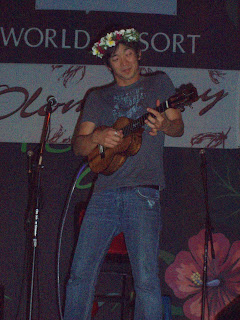
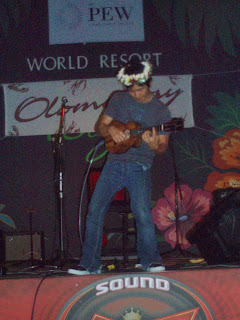
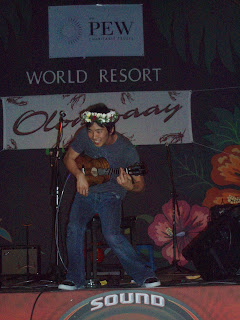
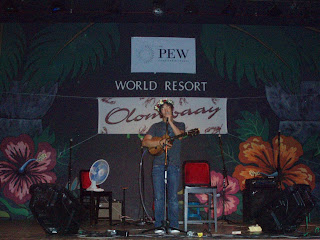
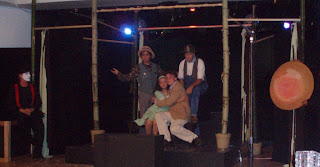
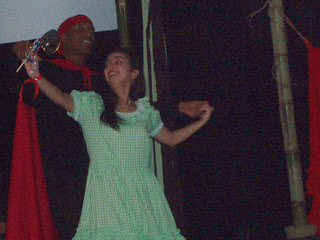
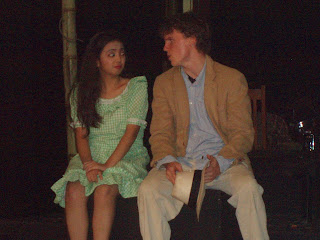
Don't forget about soccer this weekend!
Such beautiful blossoms!
Wanted to thank you for your kind comment on my blog when my husband went missing.